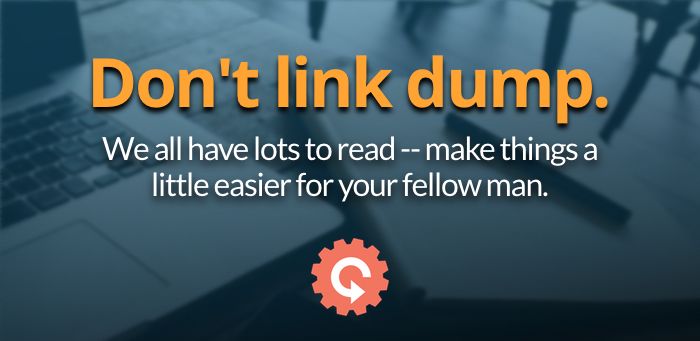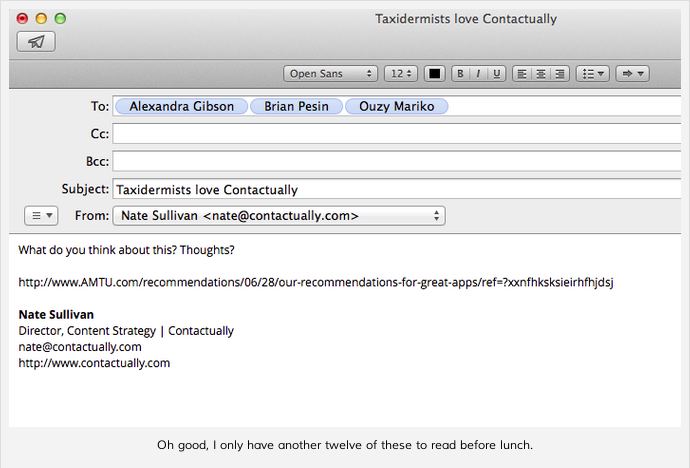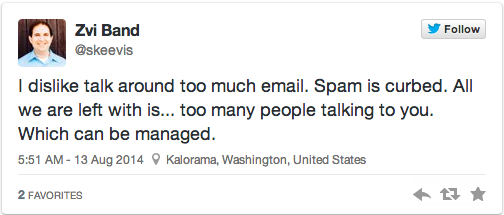You are viewing our site as a Broker, Switch Your View:
Agent | Broker Reset Filters to Default Back to ListYou Better Read This Before You Email That Link of Yours
August 19 2014
The link is not enough — don't be a link dumper.
 Here's a scenario that happens a lot. You're on the internet (I know, shocking), when you find something online that interests you. It could be a new service, or a competitor's site, or even just the latest piece of delicious, Buzzfeedy-clickbait ("This puppy thought he couldn't get any cuter — you won't believe what happened next!"). Your coworkers need to know about this, so you quickly open your email and tap out this bad boy.
Here's a scenario that happens a lot. You're on the internet (I know, shocking), when you find something online that interests you. It could be a new service, or a competitor's site, or even just the latest piece of delicious, Buzzfeedy-clickbait ("This puppy thought he couldn't get any cuter — you won't believe what happened next!"). Your coworkers need to know about this, so you quickly open your email and tap out this bad boy.

If you think you've just done something useful, congratulations! You're a link dumper. Unfortunately, even the most well-intentioned link dumpers aren't really that helpful. But... why?
Well, believe it or not, sending information is a task with a lot of different variations. If someone needs a social security number, or a date, or some other fixed bit of data, responding this way is totally fine. They asked for something, you gave them that something, and everyone is happy. Back to Tinder!
On the other hand, sending someone an idea, or starting a conversation is a little more complicated. Here are some reasons why just sending someone a link and asking "what do you think" is a bad way to go.
1. They don't know which part of the link you're interested in talking about.
Sure, the key takeaways of your dumped link seem obvious to you, but that's because it's your link! Everyone else is left trying to figure out the connection between whatever you shared, and the mystery idea in your head. This is just begging for an open-ended, unstructured back and forth that accomplishes nothing.
How to fix it: Don't dump links on people. Base your message around a question, and include the link as reference material, or even better, send the part of the site/etc. that's most relevant. If you only care about something that fits in a screenshot, or a quote, by all means — send that instead (and just include the source as a courtesy for interested parties).
2. They don't have time to cover everything.
Our fearless leader had a great quote the other day on Twitter. In the interest of possibly getting a better chair, allow me to promote it here.

It's true — too many people can be managed! And we can make that process a whole lot easier by being good email citizens, and taking into consideration the fact that people get A LOT OF EMAIL. If you want someone to share their opinion or expertise after reading something from you, make it as easy and simple as possible to answer. You're not a high school English teacher assigning an essay topic — people usually don't have to respond to you. If doing so becomes a project, your email (and your topic) is probably going to die.
How to fix it: Don't ask generic questions like "What do you think?" People think lots of things. Ask them if they think you should do something similar to what's suggested by the link (and mention what you think that is if it's not crystal clear), or if they are worried about a problem mentioned there.
3. They don't want to repeat themselves, or answer for someone else.
When you email a bunch of people, you're going to be dealing with a lot of opinions, and varying areas and levels of expertise. If you want to hear about the sales impact from your sales lead, and the SEO impact from your marketing lead, make sure you ask those people for that input in your email. You'll get a better discussion, and make responding simpler.
How to fix it: Direct questions to individuals you're including on the email. Ask your sales VP if this is something customers have mentioned, your product person if there's anyone else doing this, and your junior engineer if he or she can look into this one aspect. Anyone who gets a question knows how to answer (and to what level of depth), and anyone who doesn't can just take the whole thing under advisement.
4. They already have too many things to read.
Sometimes people use links to make sure an important topic is "discussed" among the people it affects. Unfortunately, sending one or more people a link is not the same thing as having a productive discussion about something. If it's worth talking about, you're probably going to have to set aside some time to talk about it.
How to fix it: Is sending someone a link the right way to address this issue? In today's office, we think of sending emails as doing work, or accomplishing something. While that's actually true in a lot of instances, it really depends on the circumstances. Sending someone a link doesn't mean you've successfully conveyed a point, or transferred any information. To do that, you may need to have more of a conversation... even a very simple one.
Good communication takes effort.
You'll notice a theme with all these topics — they take time. In a world where we all want to get to inbox zero and be three times as productive, this isn't just counter-intuitive; it's practically sacrilegious. But there's an enormous amount of wheel-spinning and wasted energy in modern, professional communication, largely due to people simply moving too fast and mistaking it for productivity.
To be clear, sending content is a great way to get people to think, and something we here at Contactually actively encourage. But don't settle for just being another link dumper — take some time to set up your links and shared content properly (especially when you're sending to multiple people), and you'll find that the effort is well worth it, and much appreciated.
Have a better way to share links? Or an irritating email behavior you wish people would fix? As always... let us know below.
To view the original article, visit the Contactually blog.









